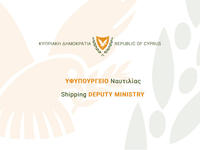Press Releases

07-12-2020 17:36
Welcoming remarks by Dr. Costas Kadis, Minister of Agriculture, Rural Development and Environment at the Virtual debate “ETS IN SHIPPING: ELIXIR OR THREAT TO SUSTAINABILITY”
It is with great honor and pleasure that I welcome you to this virtual debate, where policy-makers, ship-owners and NGOs come together to discuss how maritime activities can contribute to the mitigation of climate change.
Almost a year ago, a new phrase was added to our vocabulary, the “European Green Deal”. The European Commission has launched an ambitious strategy which aims to make Europe the first carbon-neutral continent by 2050.
The Green Deal roadmap will build a set of “deeply transformative policies” at regional and national level, across eight key areas: increased climate ambition for 2030 and 2050; clean, affordable and secure energy; a clean and circular economy; energy and resource-efficient buildings; sustainable and smart mobility; a fair, healthy and environmentally-friendly “farm to fork” food system; preservation and restoration of ecosystems and biodiversity; and zero pollution for a toxic-free environment.
Green Deal is basically a new growth strategy which will transform the EU into a fair and prosperous society, with a modern, resource-efficient and competitive economy, where economic growth will be decoupled from resource use and where there will be no net emissions of greenhouse gases by 2050.
From the outset, Cyprus has welcomed the launch of the Green Deal as a long-awaited EU development strategy which addresses the main environmental and climate issues, interconnecting them with economic development. The Government of Cyprus is committed to contributing to the successful implementation of the Green Deal.
Towards this direction, the Council of Ministers has recently approved the governance mechanism for the implementation of the Green Deal. This mechanism involves most of the Ministries of the Government and focuses on the coordination of all sectoral strategies.
Among the sectors that are called to contribute to decarbonisation is maritime transport.
In the next few years, decarbonisation will likely change the face of the maritime economy. More change is to be expected due to digitalization and the effects of the COVID-19 crisis. This systemic change brings both threats and opportunities which we need to properly address if we are to ensure long-term sustainability.
Being a European country with a highly developed shipping sector, we have decided to organize this event to openly discuss how maritime transport can make a meaningful contribution to climate change while safeguarding its competitiveness. I take this opportunity to congratulate the Shipping Deputy Ministry for taking this initiative. I warmly thank our distinguished panelists, who will share their valuable knowledge and ideas on this issue.
(MAK)
Relevant Press Releases






